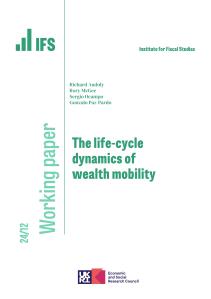I despair. There was speculation published on the front page of this newspaper on Saturday that the government is considering abolishing inheritance tax as a pre-election giveaway.
If this has any basis in truth, one wonders what is the point of all the work done by the Office for Budget Responsibility (OBR), which set out on Thursday in the starkest of terms the severe fiscal challenges that face us. I also wonder what the point is of all the work done by my colleagues at the Institute for Fiscal Studies, and elsewhere, showing that even with the current tax regime, inheritance is becoming an increasingly important driver of falling social mobility.
What is the question to which abolishing inheritance tax is any sort of plausible answer? What do we need to do to make the tax system work better? What would improve social justice? What is a priority, given the state of the public finances? What is remotely affordable?
None of those.
Well of course I know the answer: what can we dangle before the electorate that might help to get us re-elected? I am afraid I have a warning for the electorate, and this applies not just to proposals to abolish inheritance tax, but to any proposals for tax cuts or spending increases. They will have to be paid for.
That, in spades, is the warning from Richard Hughes and his colleagues at the OBR. Whether you look at the short run, the medium run or the long run, our public finances are in a parlous state. It is also, by the way, a warning from history. Governments do often cut taxes before elections. They equally often raise them again afterwards.
Whether it is Rachel Reeves or Jeremy Hunt occupying 11 Downing Street after the election, they have my genuine sympathy. I cannot remember a time when the choices over tax and spending have looked so difficult. The cost of servicing our growing national debt is rising so much that just stabilising debt as a fraction of national income will require running a big primary surplus. That is, we will need to raise considerably more in tax than we spend on public services, pensions and benefits, just to avoid putting the debt burden on an ever-increasing path. Both Reeves and Hunt have pledged not to put us in that position.
So, what are the options? As ever they are perfectly clear. If you want lower taxes you will either have to accept lower spending or higher borrowing and debt. If you want higher spending, you need to accept either higher taxes or higher borrowing and debt. It should not need spelling out. I would love both main parties to say so very clearly.
What about that higher borrowing and higher debt path? It is oh so tempting. Our debt is not especially high by G7 standards. It was higher over long periods of the 19th and 20th centuries. There are times when it is the right path. If I can put words into the mouths of the OBR, though, I think they would say, indeed shout from the rooftops, that the message of their report is “this is not that time”.
In the period after the Second World War growth, demographics and falling defence spending were all on our side. Debt fell swiftly. They are all against us now. Growth is poor, interest rates are high, demographic change will increase spending on pensions, health and social care and defence spending is more likely to go up than down. Add to that pressures to spend more in response to climate change, the swift loss of billions of fuel duty revenues and rather regular economic crises and debt will rise and rise even without any discretionary tax cuts or spending increases. More spending equals more tax; less tax equals less spending.
Both are possible. Taxes in the UK are at their highest level ever but they are still well below the average of our western European neighbours. We can raise them. We can get some from capital gains and non doms and the rest but significant increases will hit more of the electorate than that.
We could cut spending but after the austerity of the 2010s it is fatuous to claim that to do so to any significant degree will be anything other than painful for our public services or for those who rely on benefits.
Those are the trade-offs and they are starker than ever. I have refrained over the past few months from using this column to plug my new book Follow the Money. Trade-offs are what the whole book is about: how we need to be honest about them and how we have continually made the wrong ones, especially if we give a fig for economic growth. To put it another way, if we care for the living standards of ourselves and our fellow citizens.
So, if policy is about priorities and making trade-offs, what would abolishing inheritance tax tell us about the government’s grasp of those priorities and trade-offs? On priorities, that continuing to protect the assets of a relatively well-heeled minority continues to come high up the list and concern for social mobility a long way down. On trade-offs, that they are not really willing to grasp them at all.
Let’s hope that those reports in this paper were off the mark. Maybe what is actually being cooked up in Downing Street is a plan to reform rather than abolish inheritance tax. That is long overdue. It could, for example, involve plugging some of the more egregious loopholes while cutting the rate. I would be all for that.
I hope even more fervently that Sunak and Hunt, Starmer and Reeves, are poring over the OBR’s report, internalising it and preparing to lay some tough choices before the electorate. I am not holding my breath.
This article was first published in The Times and is reproduced here with kind permission.









